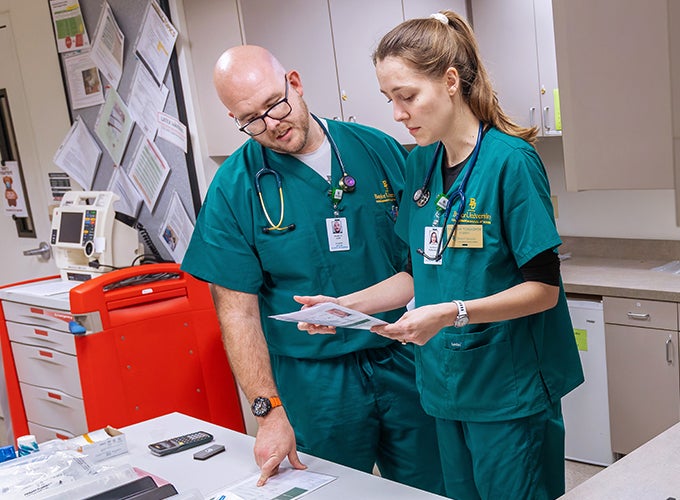Join Us as a Baylor Preceptor
Baylor University’s Louise Herrington School of Nursing (LHSON) Online is in search of Advanced Practice Registered Nurses (APRNs) and Registered Nurses (RNs) whose discipline may include family practice, women's health, pediatrics, adult-gerontology, psychiatric-mental health, med-surg, among other medical practices. The requirements to become a preceptor vary by program.
Preceptors are valuable healthcare providers who share their experience and help mentor nursing students by providing real-world learning opportunities and experiences in a clinical setting. As a Baylor preceptor, you will be working with nursing students that have been educated at the highest level of academic excellence. Additionally, you will help advance the careers of nursing professionals and give back to the profession in which you yourself received mentorship. In fact, many preceptors find great pride in giving back to the profession in which they work.
Help shape the next generation of nurses
At Baylor University, we are committed to the ideals of servant leadership and have made it our mission to educate nurses for worldwide leadership. During the last 111 years, LHSON has educated more than 6,000 graduates who are academically and personally prepared for leadership as nursing professionals. Our students are dedicated to their profession and pursue nursing excellence at the highest level.
At the heart of our school is an exceptional faculty, each and every one of whom is committed to the success of our students. As a preceptor, you will also help play a role in the success of Baylor nurses and would be considered a vital component in their future in the nursing field.
Why become a preceptor?
Nurses and doctors become preceptors for a variety of reasons. Perhaps the most common is the opportunity to share their expertise with nursing students and witness students' professional development amidst their own clinical settings. Baylor nurses are educated at the highest level and are committed to excellence in caring for the patients you serve.
Benefits of becoming a preceptor include:
- Helping educate students is a way to train the next generation of nurses and pay forward the experience you had with your preceptor.
- Being a preceptor strengthens your own knowledge and reinforces your own experience.
- Baylor nursing students are highly educated, driven and are taught the most current nursing practices. Many times, they can share their own knowledge they have learned at Baylor.
As a preceptor, you have the opportunity to give back to the field of healthcare, assist in creating positive change and help to inform the next generation of nurses.
Contact Us
Your support of our students and programs is greatly appreciated. If you or someone you know may be interested in precepting, please contact: info@placement.keypathedu.com
Preceptors Needed For:
The post-baccalaureate accelerated BSN program at Baylor University’s Louise Herrington School of Nursing is an intensive full-time program with a combination of teaching methodologies including online courses, clinical and lab experiences, and hybrid interactive learning courses. Students with a completed bachelor's degree in a non-nursing discipline will complete 62 hours of nursing coursework and will have the opportunity to:
- Gain clinical experience working with underserved communities
- Benefit from strong academics and a well-earned reputation
- Learn nursing through a Christian worldview
- Change your life and the lives of others
With an emphasis on the elements of professional nursing, the curriculum provides a detailed study of foundations, processes, and standards.
A Preceptor must have an unencumbered license to practice as a Registered Nurse (RN) in the state of practice.
Preceptors have the opportunity to support students for 90 hours or up to 720 clinical rotations hours.
-
This course introduces the role of the professional nurse as a member of the interprofessional healthcare team through concepts such as the nursing process, standards of practice, and the philosophy of nursing from a current and historical perspective. Critical thinking, therapeutic communication, and caring are also introduced as tools to enhance the nurse-patient relationship.
-
-
This course introduces the role of the professional nurse as a member of the interprofessional healthcare team through concepts such as the nursing process, standards of practice, and the philosophy of nursing from a current and historical perspective. Critical thinking, therapeutic communication, and caring are also introduced as tools to enhance the nurse-patient relationship.
Preceptor FAQs:
A preceptor is an experienced licensed practitioner who provides professional instruction and supervision during clinical practice and facilitates the application of theory to practice for nursing students.
A Preceptor must have an unencumbered license to practice as a Registered Nurse (RN) in the state of practice.
- Unencumbered license to practice as an Advanced Practice Registered Nurse (A.P.R.N.) in the state of practice
- Eligible to practice in an advanced practice role as deemed appropriate by the state’s Board of Nursing
- Board-certified as a nurse practitioner or A.P.R.N.
- Functioning as an advanced practice nurse in a primary care or approved specialty practice setting
- Committed to providing quality patient encounters
Preceptors have opportunities to provide immediate feedback as well as a more formal assessment of student performance in the form of evaluations.
The time commitment varies by program and by rotation.




